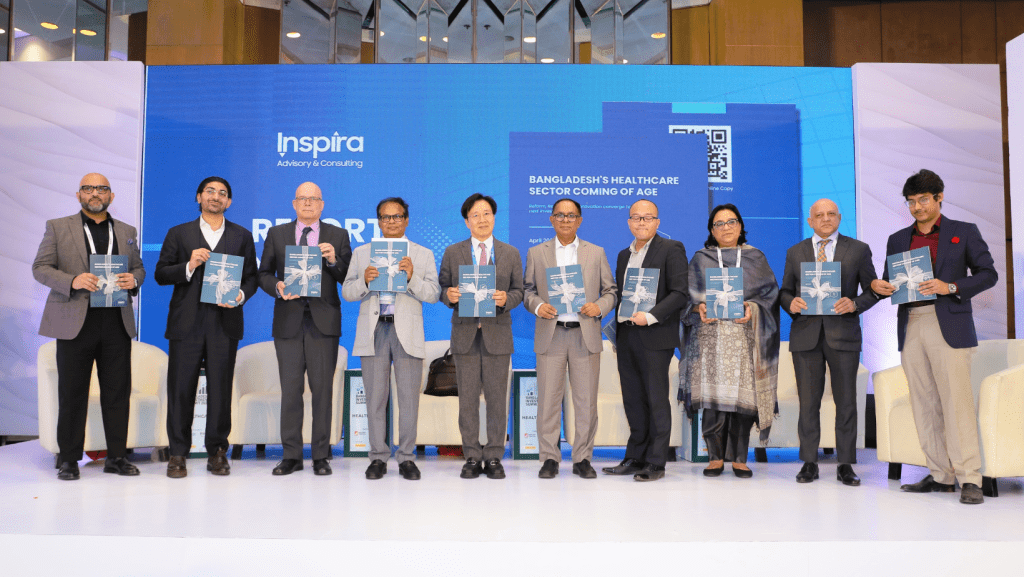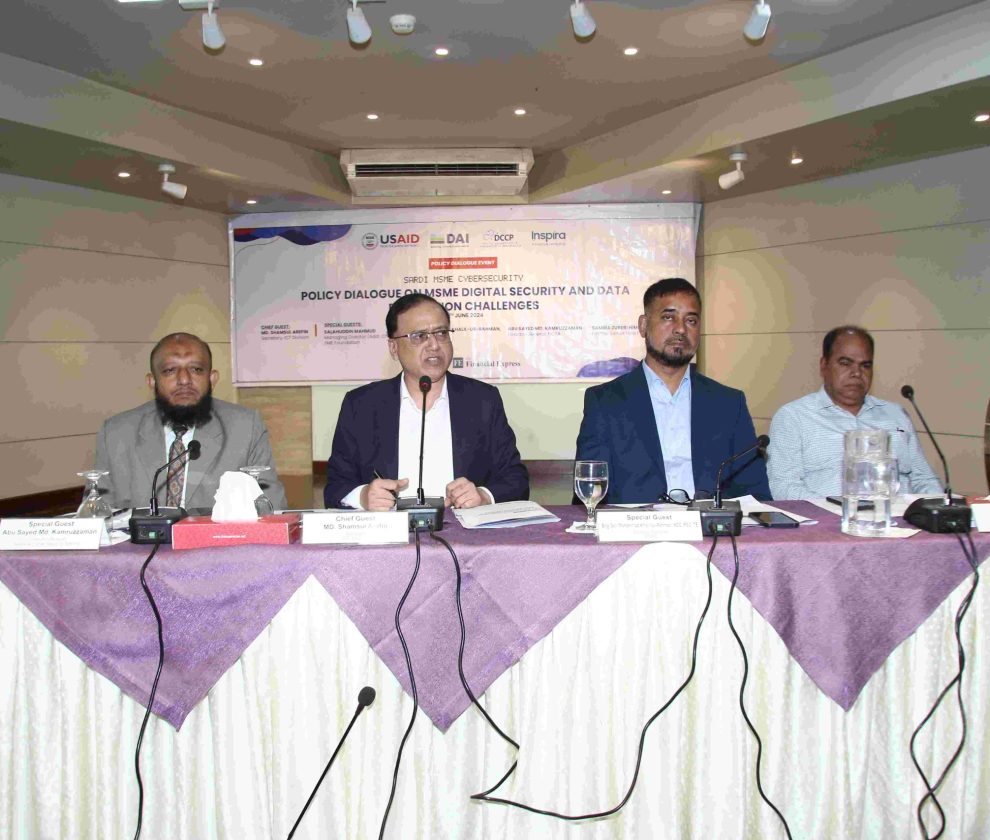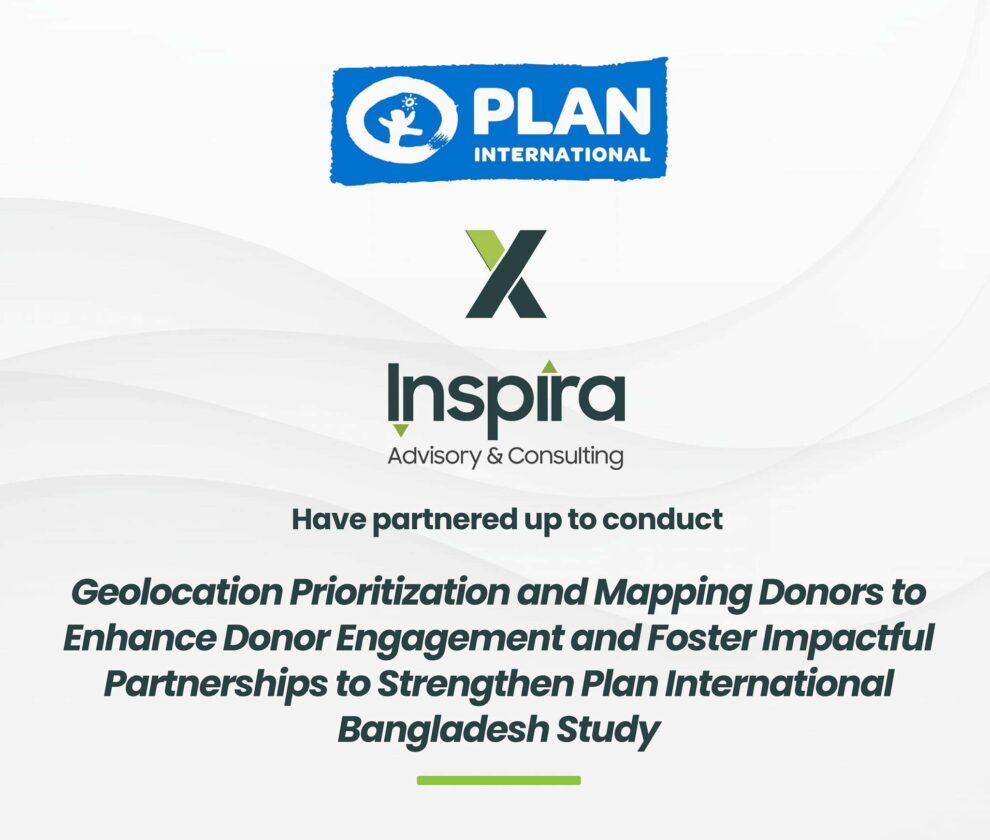On April 10th, 2025, Inspira co-organized the Healthcare Breakout Session at the Bangladesh Investment Summit 2025. The session attracted over 350 participants, including a diverse group of industry leaders, investors, and healthcare professionals, to discuss the future of Bangladesh’s rapidly growing healthcare and bioeconomy sectors. The summit, which included panels, keynote speeches, and investment matchmaking sessions, painted a promising picture of the country’s potential to become a regional hub for healthcare innovation. Here’s a closer look at the key moments and discussions from the event.
A Vision for Bangladesh’s Healthcare Future
The event began with an inspiring keynote address by Sylvana Quader Sinha, whose words set the stage for the entire event. She highlighted the remarkable growth of Bangladesh’s healthcare sector, which is expanding at a pace faster than the broader economy. Private health spending, which accounts for a substantial 72% of the total health expenditure, reflects the rising demand driven by a growing middle class. Sinha emphasized that the country is witnessing a shift in demand and a golden opportunity for investors to capitalize on the gaps in healthcare infrastructure.
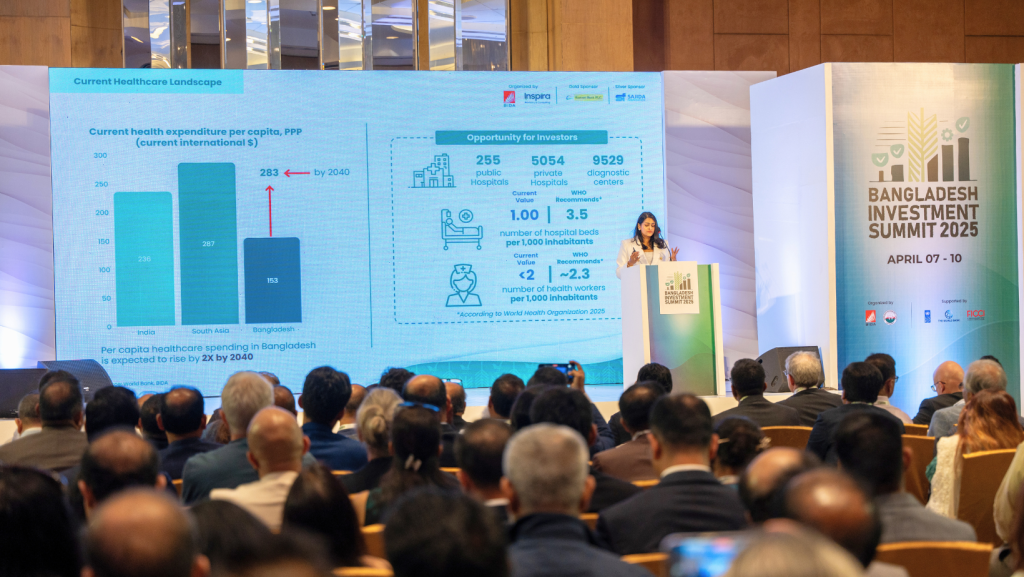
The shortage of hospital beds, healthcare workers, and advanced medical services has resulted in millions of dollars flowing abroad every year for treatments that could potentially be provided locally. As Sinha spoke about the opportunities in tertiary care specialized services such as cancer treatment, advanced cardiac surgery, and organ transplants, there was a clear consensus among the audience: the future of healthcare investment in Bangladesh lies in enhancing high-quality care, particularly in specialized hospitals and diagnostic centers.
Healthcare as a Thriving Investment Landscape
The first panel discussion, “Unlocking Healthcare Investment Potential in Bangladesh,” featured prominent voices from industry leaders such as Dr. A M Shamim, Founder & Managing Director of Labaid Group, and Martin Holtmann, Country Manager at IFC. They shared their perspectives on the vast potential of Bangladesh’s healthcare market, currently valued at USD 14–20 billion and expected to grow exponentially. The panelists agreed that while Bangladesh’s healthcare system is expanding, there is still a substantial need for investment in specialized tertiary care services.
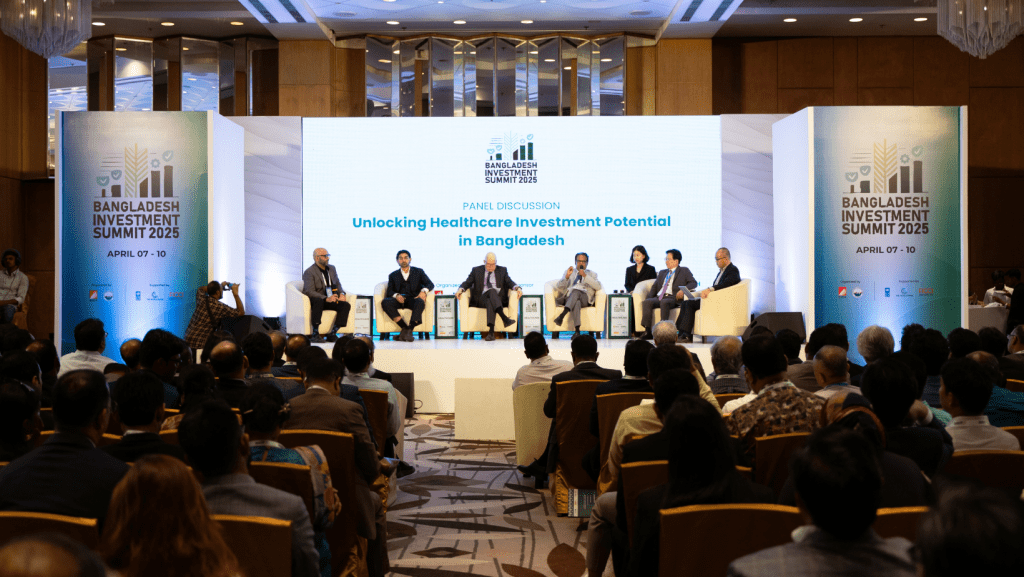
The pharmaceutical sector also took center stage during the discussion. Syed Omar Kabir, General Manager at Renata Pharmaceuticals, spoke about the impressive growth of Bangladesh’s pharmaceutical industry, which already meets 98% of the domestic demand. However, to compete globally, the focus must shift towards high-value products, including biosimilars, monoclonal antibodies, and complex formulations. The country’s growing capacity for pharmaceutical R&D is an exciting prospect for investors looking to capitalize on the growing global demand for affordable medicines.
The Role of Digital Health and Technology
Throughout the day, technology emerged as a major theme. Panelists emphasized the growing role of digital health in Bangladesh’s healthcare transformation. With over 100 million internet users, the country is poised to harness the power of telemedicine, remote monitoring, and data analytics to expand access to healthcare. Despite some initial caution around the costs and reimbursement structures, the long-term potential of digital health, especially in telemedicine and centralized electronic medical records (EMR), sparked much discussion.
Futoshi Kono, Director of Ship International Hospital, pointed out that Bangladesh’s digital health market is growing at a rate of over 10% annually, making it an exciting sector for both local and international tech-driven companies. This growing trend offers not only improved patient outcomes but also an opportunity to reduce healthcare costs, which can be a game-changer for the country’s healthcare landscape.
Bangladesh as a Bio Hub: Unlocking the Potential
As the day progressed, the summit took a deeper dive into Bangladesh’s growing bioeconomy sector. The second panel discussion, “Bangladesh as the Regional Bio Hub,” explored the vast potential of bioeconomy—defined as harnessing living organisms for commercial, medical, and industrial purposes. Dr. Abed Chaudhury, Co-Founder of Genofax Life Sciences, spoke about the increasing role of genomics, gene editing, and bioinformatics in healthcare innovation.

One of the key highlights was the emphasis on Contract Research Organizations (CROs), which are rapidly filling the gap in drug development and clinical research. The country’s large, diverse population, coupled with its growing medical infrastructure, has made it an attractive destination for CROs looking to conduct bioequivalence studies and clinical trials. This growing ecosystem presents a strong case for Bangladesh becoming a leader in biotechnology, particularly in personalized treatments, climate-resilient crops, and methane mitigation in livestock. The panel also touched on the importance of international collaboration. Speakers such as Fabrice Gachot, Senior Business Development Leader at
Cytiva, and Yuji Wagata, Chief Representative at Toyota Tsusho Bangladesh, emphasized the need for strong partnerships between local and multinational players to drive the bioeconomy forward. They called for the creation of regional biotech clusters where universities, startups, and large corporations could collaborate to produce cutting-edge innovations.
Policy Support and the Way Forward
As the event drew to a close, the importance of policy reforms became a recurring theme. Panelists across both sessions stressed the need for government policies that simplify regulatory frameworks, ensure consistent infrastructure support, and provide incentives for biotech and healthcare research. A crucial part of this conversation was the call for greater investment in talent development. Industry leaders agreed that strengthening educational institutions, offering specialized training, and encouraging public-private partnerships are all essential for creating a sustainable, globally competitive ecosystem in Bangladesh.
The spotlight session featured key voices from the pharmaceutical sector, including Abdul Muktadir, Chairman of Incepta Pharmaceuticals, who underscored the urgency of policy reforms to support the growth of Bangladesh’s pharmaceutical and biotech industries. Access to reliable energy, streamlined regulations, and a supportive policy environment are all necessary to ensure the scalability of local manufacturing, particularly in vaccines and biologics.
A Glimpse of the Future
By the end of the day, the message was clear: Bangladesh’s healthcare and bioeconomy sectors offer immense potential for growth. With the right investments in infrastructure, digital health, R&D, and regulatory reforms, the country is well-positioned to become a regional leader in healthcare innovation. The insights shared at the Bangladesh Investment Summit 2025 reaffirmed the country’s promise as a key player in both regional and global healthcare markets.
As the event concluded, the excitement among participants was palpable. From pharmaceutical giants to biotech startups, the summit had successfully brought together a diverse group of stakeholders, each with a shared vision for transforming Bangladesh into a healthcare and bioeconomy powerhouse.


